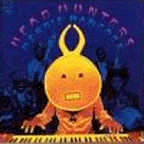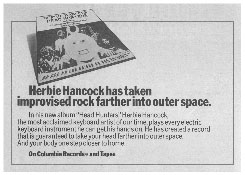![]()
  |

Head Hunters
Herbie Hancock
Columbia 32731
Released: October 1973
Chart Peak: #13
Weeks Charted: 47
Certified Platinum: 11/21/86
 Herbie Hancock has dissolved his old sextet and abandoned the extensive synthesizer overdubbing which marred his previous solo LPs. Headhunters, tight and concise, could be called soul-jazz (soul in a Sly, Seventies sense), but there's more to it than that. "Watermelon Man," Hancock's Sixties funk classic, gets a new arrangement that reveals the changes. It begins with an African-style flute-and-whistle ensemble. Electric piano, bass, drums, saxophone and percussion fade up from under the flutes with a stretched, but by no means spaced, reinterpretation of the tune's original line. The track then develops compositionally, with little improvisation, until the African flutes return. The longer pieces are just as direct. Hancock's masterful use of the ARP Odyssey creates a string section under his cooking electric piano solo on "Chameleon," while saxophonist Bennie Maupin, the only holdover from Hancock's previous group, finally gets enough solo space to demonstrate his considerable originality. Headhunters is Hancock's best album in several years and should give Stevie Wonder and Sly fans something to think about, since it uses their innovations as a basic premise from which to expand into coherent and captivating new ideas.
Herbie Hancock has dissolved his old sextet and abandoned the extensive synthesizer overdubbing which marred his previous solo LPs. Headhunters, tight and concise, could be called soul-jazz (soul in a Sly, Seventies sense), but there's more to it than that. "Watermelon Man," Hancock's Sixties funk classic, gets a new arrangement that reveals the changes. It begins with an African-style flute-and-whistle ensemble. Electric piano, bass, drums, saxophone and percussion fade up from under the flutes with a stretched, but by no means spaced, reinterpretation of the tune's original line. The track then develops compositionally, with little improvisation, until the African flutes return. The longer pieces are just as direct. Hancock's masterful use of the ARP Odyssey creates a string section under his cooking electric piano solo on "Chameleon," while saxophonist Bennie Maupin, the only holdover from Hancock's previous group, finally gets enough solo space to demonstrate his considerable originality. Headhunters is Hancock's best album in several years and should give Stevie Wonder and Sly fans something to think about, since it uses their innovations as a basic premise from which to expand into coherent and captivating new ideas.
- Bob Palmer, Rolling Stone, 3/28/74.
Bonus Reviews!
Pianist Hancock seems to have come back down to earth after several albums of floating around in electronic space. One gets the impression that he has been shown the light by new producer Dave Rubinson that music can be fun as well as funky and still be art. Hancock and his four associates are heard here in a program that gets back to simple swinging, but that allows for adventurous melody lines and chord progressions. And lots of down home soul. Dig the bass figure on "Chamelon" and Hancock's electronic support. Side two is much deeper, so as not to kill off all those space fans who enjoyed his previous efforts.
- Billboard, 1973.
 Click image for larger view. |
- Richie Unterberger, The All-Music Guide to Rock, 1995.
Is it jazz or is it funk, and who cares anyway when genius pianist Herbie Hancock steps up to the plate to enlighten a generation of white boys on what it means to be funky? On this successful crossover effort, the band is so tight you would swear they're telepathic, and their leader has never been afraid to take chances, so the schizo combination of genres is sure to shake your bones to the marrow. * * * * *
- Zagat Survey Music Guide - 1,000 Top Albums of All Time, 2003.
After the cryptic electronic jazz of Sextant, Headhunters saw Herbie Hancock take a more linear funk route. He had been listening to James Brown and Stevie Wonder, and had recorded some unreleased session work with Marvin Gaye, but it was the polyrhythmic funk of Sly & the Family Stone that shaped his next move.
Hancock stripped away the exploratory jazz baggage of his hugely innovative -- and hugely unprofitable -- Mwandishi Sextet, retaining only multi-reedist Benny Maupin from that lineup, and enlisting Paul Jackson to play the role of Sly Stone's finger-popping bassist Larry Graham. It ended up sounding nothing like Sly Stone, but it did invent several genres of music.
Somewhere in the juddering, chromatic bassline of "Chameleon" is the DNA for electronic dance music. Tangled up in Herbie's modal improvisations on the Fender Rhodes are the first rumblings of smooth jazz, while enmeshed in Harvey Mason's crisp, razor-sharp breakbeats is the birth of techno, disco, and drum 'n' bass.
Unlike Hancock's subsequent electric funk outings, Headhunters retains a vestigial avant-garde sensibility -- the mournful, military two-step of "Vein Meter," the wobbly, mutant funk of "Sly," the beer-bottle hollers of "Watermelon Man" (a rereading of his 1962 R&B hit, here based on an African pygmy chant).
The band would go on to record two much-sampled albums as The Headhunters, and Hancock's subsequent career would contain smatterings of genius, but no one here bettered this seminal jazz-funk masterpiece.
- John Lewis, 1001 Albums You Must Hear Before You Die, 2005.
Further reading on Super Seventies RockSite!: |
That philosophical shift led him to Head Hunters, the band built around bassist Paul Jackson, drummer Harvy Mason (later Mike Clarke), percussionist Bill Summers, and reedman Bennie Maupin. And that led to an album that opened up worlds even the visionary Hancock didn't foresee. Four extended jams built on simple recurring rhythm figures modeled after the hits of then-massive Sly and the Family Stone, Head Hunters, represented a leading edge of electric funk exploration then. It remains a landmark still.
The opening track "Chameleon" is an instant firestarter: Built on a Sly-like motif (Hancock once said these songs came to him after he visualized what it would be like to play in Stone's band), it's wound much tighter than most fusion. The revolving-door loop practically forces the soloists to reach beyond typical blues-based riffing, and Hancock responds with shimmering, at times impressionistic electric piano colors that float over the timekeeping agitations. All of the solos are cool and cosmopolitan -- to experience an absolute peak of electric jazz, check Hancock's up-tempo romp on "Sly." Against a squabbling clavinet part that is jaw-dropping all by itself, Hancock drops a series of syncopated electric piano figures that are every bit as cogent and adventurous as his memorable turns with Davis's '60s quintet. Head Hunters became the bestselling jazz album of all time and made Hancock a legend. Naturally, it happened immediately after he stopped worrying about being a legend.
- Tom Moon, 1,000 Recordings To Hear Before You Die, 2008.
Under the influence of Sly Stone, jazz pianist Herbie Hancock unified "the jungle, the intellectual, and the sex" -- and gave jazz its first platinum-selling LP. Head Hunters is an aerodynamic groove machine built around catchy riffs, squelching synths, and airtight, danceable beats.
Head Hunters was chosen as the 254th greatest album of all time in a Rolling Stone magazine poll of artists, producers, critics and music industry figures in Oct. 2020.
- Rolling Stone, 10/20.
![]() Reader's Comments
Reader's Comments
No comments so far, be the first to comment.
